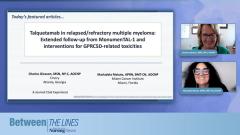
GPRC5D-Related Adverse Effects: Clinical Strategies for Monitoring Patient Care and Safety of Talquetamab
Panelists discuss how talquetamab’s unique GPRC5D-related toxicities are managed proactively using International Myeloma Working Group guidelines, balancing outpatient delivery with vigilant monitoring and tailored cytokine release syndrome prophylaxis strategies.
Episodes in this series

The International Myeloma Working Group (IMWG) guidelines remain the standard for managing immune-related toxicities associated with bispecific antibodies, such as cytokine release syndrome (CRS) and immune cell–associated neurotoxicity syndrome (ICANS). With talquetamab, CRS is typically low grade (grade 1), and ICANS is rare. Clinicians often manage mild CRS with dexamethasone, reserving tocilizumab for higher-grade events or cases involving clinical decompensation. Although ICANS is uncommon, new safety signals such as ataxia or balance disorders have recently emerged, prompting increased awareness, though not yet seen widely in clinical practice.
What differentiates GPRC5D-targeted therapies like talquetamab from B-cell maturation antigen (BCMA)–directed agents is the unique toxicity profile driven by GPRC5D expression in keratin-producing tissues. Oral toxicities—especially dysgeusia—are common and often appear early in treatment, significantly affecting patients' sense of taste. Skin and nail toxicities are also frequent, including palmar erythema, nail brittleness or detachment, and rashes. Centers have implemented proactive strategies, including baseline oral assessments, patient education handouts, and supportive measures like chlorhexidine rinses, Biotène, topical steroids, and antihistamines. Nail monitoring and protective foot care are emphasized to prevent secondary infections.
Approaches to CRS prophylaxis vary by institution. In outpatient settings, some centers administer prophylactic tocilizumab with the first dose to mitigate CRS risk, especially in patients treated entirely outside the hospital. Others reserve prophylaxis for high-risk cases or dual bispecific regimens (eg, talquetamab plus teclistamab). Some clinicians also provide patients with prescriptions for dexamethasone to manage early symptoms such as fever or tumor flare at home, supported by 24/7 access to oncology urgent care. This hybrid of proactive monitoring and flexible response has allowed greater outpatient delivery of therapy while maintaining patient safety.
Newsletter
Knowledge is power. Don’t miss the most recent breakthroughs in cancer care.



































